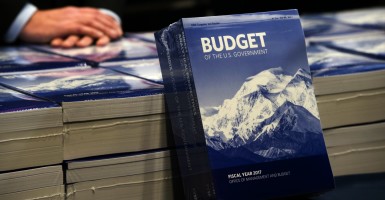President Barack Obama has released his final budget to Congress, shifting the federal budget process into high gear. Budgeting for the nation is a complicated and iterative process. Here is how the president’s budget fits in to that process:
Q: Who writes the president’s budget?
A: Starting in the spring of the previous year, the president works closely with the Office of Management and Budget, or OMB, to assess the budget asks of federal agencies. These parties negotiate the funds to provide to agencies for the coming year. After each agency’s individual budgets have been negotiated, federal agencies release finalized proposals to the administration. These are compiled in the president’s budget.
Q: What does the budget timeline look like?
A: The president must submit a budget to Congress by the first Monday of February. However, since the start of the Obama administration, the budget has been released on time only twice.
After the budget is released on Feb. 9, Congress will begin the lengthy process of reviewing it and determining what changes to adopt and which ones to ignore. However, Congress ultimately holds the power of the purse and has no obligation to enforce or use any presidential budget recommendations.
Q: What is the president’s budget?
A: The president’s budget is a request to Congress suggesting what federal spending should look like in the coming fiscal year. The presidential budget includes detailed and comprehensive appropriations language for the next fiscal year along with 10-year projections that outline the future of the nation if the budget were followed.
Another key component of the president’s budget is the presidential budget message. In last year’s presidential budget message, the president mentioned climate change eight times. His commitment was mirrored in the actual budget, with a $1.29 billion proposal for a Global Climate Change Initiative. According to Heritage Foundation economist Nicolas Loris, the initiative “wastefully uses funds—which do little to foster independent economic growth for green energy projects and to ostensibly help developing countries cope with global warming.”
Q: Why does the presidential budget matter?
A: Most importantly, the president’s budget includes explicit appropriations language that determines how every executive agency is funded. This is the critical component of the president’s budget that makes it so important in the federal budget process. The 10-year projections further outline the presidential policy agenda for the coming years.
The president’s budget shows the public exactly where the administration stands. In the budget, the president reveals publicly what the administration’s top priorities are and how he wishes to fund these.
This being Obama’s final budget, it will likely take the form of a vision and legacy document. The president and his administration will restate their budgetary accomplishments and hope to compel future leaders to follow their path.
Q: What should the president’s budget look like?
A: With national debt now soaring above $19 trillion, the president and Congress should work together to restore fiscal responsibility by putting the budget on a path to balance, cutting spending, and reducing deficits and debt. Taking these steps with a conservative budget in the Congress would improve the fiscal health of our nation, reduce the burden on future generations, and unshackle the economy to enable the American people to prosper.

























